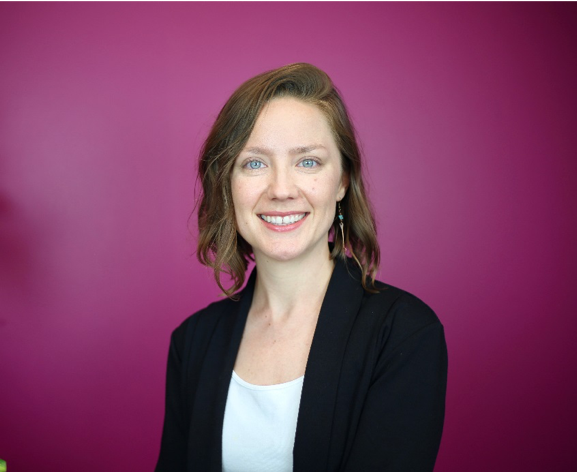
My name is Claire Dunlap. I serve on the Minnesota Evaluation Association (MNEA) board as program co-chair and work at Youthprise as director of organizational effectiveness. I’m here to share how and why we engage youth in our processes and decisions at Youthprise, and it starts with our mission.
Youthprise’s mission is to reduce disparities with and for Minnesota youth. We do this by mobilizing and investing resources, advancing knowledge and advocating for change in three impact areas: learning and leadership, economic opportunity, and health and safety. Youthprise strives to center youth in all of its work.
For us, centering youth looks like people between the ages of 16-25 serving on our board and staff, and leading and co-leading philanthropic giving, research, evaluation, communications, and trainings. Our 20-member board of directors is made up of 50% youth, and operates using a youth-adult co-chair model, meaning the board and its four committees are each co-chaired by a youth and adult.
In 2017, Youthprise elevated its focus on youth-centered evaluation. We worked with students at the University of Minnesota to recreate our theory of change and corresponding logic model. We brought it to stakeholders (of which, about 50% were young people) to make further revisions. Since then, we have hired two strategy and impact youth fellows focused solely on evaluation efforts, Ladan Ghedi and Simone Woods. Together, we are implementing three strategies to improve how we measure impact: revising our grantee report to be aligned with our logic model, conducting grantee interviews to add narrative, and issuing a State of MN Youth report to show growth and gaps for Minnesota youth.
Our next step is to bring youth-led evaluation to the program level at Youthprise; we look forward to sharing this work in the near future!
Hot Tips:
- Center the people who are most impacted in the processes and decisions!
- Strive to understand the systems of power that give certain folks privilege while marginalizing others (white supremacy, patriarchy, ageism, etc.)
- Always check your privileges (act!):
- Mind the space you take up
- Uplift folks who are marginalized by the very systems that give you privilege
- Change laws and policies that sustain systems of power
- Organize to abolish systems of power
***These were created by youth on the YPAR team! (See: Rad Resources)
- When you can’t act, advocate!
Lessons Learned:
- Don’t tokenize young people [sub: your audience] – this will have a negative effect.
- Pay for young people’s [your audience’s] time and knowledge!
- Centering youth [your audience] will take longer – BUT it will also yield better results!
- Only commit to what you can do well – say no when saying yes will further harm youth [your audience].
Rad Resources:
- YouTube: #RaceAnd videos
- Youth Participatory Action Research (YPAR) toolkit, available for purchase soon at: youthprise.org
Hot Tip for visitors to Minneapolis for Evaluation 2019:
If you are looking for an evening fun activity, some of our local gems include mini-golfing at Can Can Wonderland, bowling at Memory Lanes, or taking in some of our local sounds and internationally recognized music artists at the world famous night club First Avenue.
We’re looking forward to the fall and the Evaluation 2019 conference all this week with our colleagues in the Local Arrangements Working Group (LAWG). Do you have questions, concerns, kudos, or content to extend this aea365 contribution? Please add them in the comments section for this post on the aea365 webpage so that we may enrich our community of practice. Would you like to contribute to aea365? Review the contribution guidelines and send your draft post to aea365@eval.org.


Hello Ms. Dunlap,
I greatly enjoyed reading your post titled “Centering Youth”. It was great to learn that an organization that supports youth actually involves those youth in its evaluation process. Your post raised several important points, the most important of which was to “Center the people who are most impacted in the processes and decisions”. Carol Weiss supported your statement in her 1998 article titled, “Have We Learned Anything New About the Use of Evaluation?”, wherein she stated “program clients also have a big stake in the program. I wish their inclusion were more widespread, especially clients from marginal groups in society”. From your description of the Youthprise, it sounds like the program has successfully managed to address this point and the results so far have been excellent.
I am a high school teacher and I feel that society often disregards the thoughts and opinions of youth because it considers the youth to be too immature or not educated enough to provide valuable insights into programs. Your program shows that this is not the case, and it brings power back to this group of individuals.
Additionally, it is wonderful that there is a program like yours that other organizations can learn from and realize the benefits of including all stakeholders in the evaluation process.
Thank you for sharing your positive experiences and I hope that in the future I will have the opportunity to read more about the progression of your program evaluation and the valued roles that youth can have in this process.
Sincerely,
Kristina Wittmann